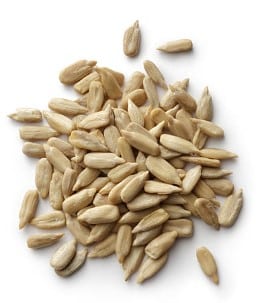

The primary symptom of a sunflower seed allergy in dogs is itchy, inflamed skin. Other signs may include excessive scratching, licking or chewing of the paws and sudden hair loss. It is also common for the inflamed skin to become red and swollen. Gastrointestinal issues, such as vomiting or diarrhea, may also occur in some cases.
Sunflower seed allergies in dogs are caused by proteins in the seeds which the immune system identifies as a harmful invader. As a result, the immune system produces antibodies and histamines to attack the sunflower seed proteins. This reaction leads to the various signs and symptoms of sunflower seed allergies, including itchy, inflamed skin, excessive scratching, licking or chewing of the paws and sudden hair loss. Gastrointestinal issues such as vomiting and diarrhea may also arise due to the immune system’s response to the allergen.
Diagnosis of a sunflower seed allergy in dogs starts with an evaluation of the dog’s clinical history and physical exam. This includes investigating the dog’s diet and any known environmental exposures related to the symptoms. Blood tests may also be performed to evaluate the dog’s immune system and determine damage. Allergy testing is sometimes used to identify the specific allergen that is causing the reaction. Treatment includes avoidance of the allergen as well as medications such as antihistamines and steroids.
Sunflower seed allergies in dogs can be quite serious and can lead to long-term problems if left untreated. The mortality rate of this allergy is very low, as it can usually be managed successfully with proper care. However, an untreated allergy can lead to skin damage, hair loss, and long-term skin conditions such as eczema and pyoderma. If left untreated, a sunflower seed allergy in dogs can cause serious complications, such as anaphylaxis.
The treatment of a sunflower seed allergy in dogs involves avoiding giving the dog any products with sunflower seeds or any other proteins derived from sunflower seeds. Anti-inflammatory medications and shampoos may also be prescribed to help reduce inflammation and itching. If the allergy is severe, the vet may also suggest allergy shots (immunotherapy).
To prevent a sunflower seed allergy in dogs, it is recommended to avoid giving them food or treats that contain sunflower seeds. Instead, look for food or treats made with other ingredients that are not known to cause allergies in dogs. Additionally, bathing your pet regularly may help reduce irritation from contact with the allergen, and monthly flea and tick treatments can help prevent further skin irritation.
Canine sunflower seed allergies are not contagious and cannot be passed on to humans. However, people can be affect by come in contact with the pollen of sunflowers, causing the immune system to overreact and result in allergies or asthma.
There are some home remedies that may help to manage a sunflower seed allergy in dogs. For example, some owners may opt to use a natural oatmeal shampoo to reduce itching and inflammation. It is also helpful to minimize the dog’s exposure to sunflower seeds and other potential allergens, such as plant-related products, by eliminating them from the diet. Additionally, owners are advised to consult a veterinarian about further strategies for managing the allergy, as well as the use of any prescribed medications.
While there are home remedies to help manage sunflower seed allergies in dogs, it is important to note that these solutions may not always be effective. Therefore, it is best to consult with a veterinarian prior to attempting any of these allergy remedies.
Some dog breeds such as Golden Retrievers, German Shepherds, Labrador Retrievers, and American Eskimo Dogs are more likely to be affected by sunflower seed allergies. Also, smaller breed dogs such as Yorkies, Chihuahuas, and Toy Poodles can suffer from sunflower seed allergies. Certain breeds, such as Boxers and Vizslas, are generally believed to be especially vulnerable to sunflower seed allergies. Dog owners should pay special attention if a dog of any breed is showing signs of an allergy, as the symptoms of sunflower seed allergy can be similar to those of other allergies.
Have you ever encountered a sunflower seed allergy in your dog? If so, how did you handle the situation? How did you respond to your dog’s symptoms and how did you manage the process? It can be difficult to witness your furry companion in pain or distress due to an allergy, but we hope that you were able to find a solution that alleviated their discomfort. Wishing you and your pup health and happiness!